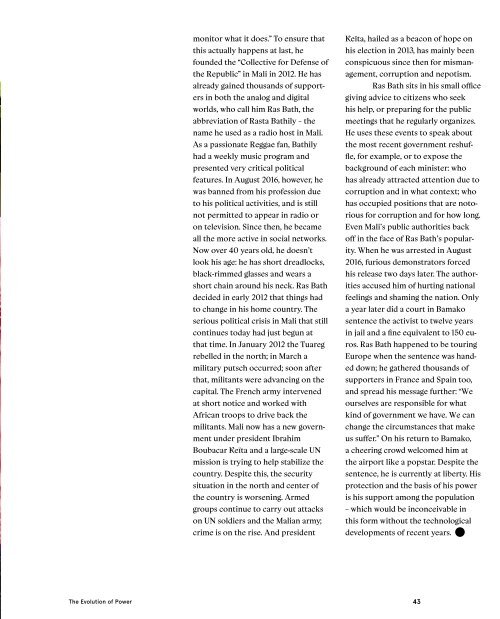CARE Affair #11 - Power
You also want an ePaper? Increase the reach of your titles
YUMPU automatically turns print PDFs into web optimized ePapers that Google loves.
monitor what it does.” To ensure that<br />
this actually happens at last, he<br />
founded the “Collective for Defense of<br />
the Republic” in Mali in 2012. He has<br />
already gained thousands of supporters<br />
in both the analog and digital<br />
worlds, who call him Ras Bath, the<br />
abbreviation of Rasta Bathily – the<br />
name he used as a radio host in Mali.<br />
As a passionate Reggae fan, Bathily<br />
had a weekly music program and<br />
presented very critical political<br />
features. In August 2016, however, he<br />
was banned from his profession due<br />
to his political activities, and is still<br />
not permitted to appear in radio or<br />
on television. Since then, he became<br />
all the more active in social networks.<br />
Now over 40 years old, he doesn’t<br />
look his age: he has short dreadlocks,<br />
black-rimmed glasses and wears a<br />
short chain around his neck. Ras Bath<br />
decided in early 2012 that things had<br />
to change in his home country. The<br />
serious political crisis in Mali that still<br />
continues today had just begun at<br />
that time. In January 2012 the Tuareg<br />
rebelled in the north; in March a<br />
military putsch occurred; soon after<br />
that, militants were advancing on the<br />
capital. The French army intervened<br />
at short notice and worked with<br />
African troops to drive back the<br />
militants. Mali now has a new government<br />
under president Ibrahim<br />
Boubacar Keïta and a large-scale UN<br />
mission is trying to help stabilize the<br />
country. Despite this, the security<br />
situation in the north and center of<br />
the country is worsening. Armed<br />
groups continue to carry out attacks<br />
on UN soldiers and the Malian army;<br />
crime is on the rise. And president<br />
Keïta, hailed as a beacon of hope on<br />
his election in 2013, has mainly been<br />
conspicuous since then for mismanagement,<br />
corruption and nepotism.<br />
Ras Bath sits in his small office<br />
giving advice to citizens who seek<br />
his help, or preparing for the public<br />
meetings that he regularly organizes.<br />
He uses these events to speak about<br />
the most recent government reshuffle,<br />
for example, or to expose the<br />
background of each minister: who<br />
has already attracted attention due to<br />
corruption and in what context; who<br />
has occupied positions that are notorious<br />
for corruption and for how long.<br />
Even Mali’s public authorities back<br />
off in the face of Ras Bath’s popularity.<br />
When he was arrested in August<br />
2016, furious demonstrators forced<br />
his release two days later. The authorities<br />
accused him of hurting national<br />
feelings and shaming the nation. Only<br />
a year later did a court in Bamako<br />
sentence the activist to twelve years<br />
in jail and a fine equivalent to 150 euros.<br />
Ras Bath happened to be touring<br />
Europe when the sentence was handed<br />
down; he gathered thousands of<br />
supporters in France and Spain too,<br />
and spread his message further: “We<br />
ourselves are responsible for what<br />
kind of government we have. We can<br />
change the circumstances that make<br />
us suffer.” On his return to Bamako,<br />
a cheering crowd welcomed him at<br />
the airport like a popstar. Despite the<br />
sentence, he is currently at liberty. His<br />
protection and the basis of his power<br />
is his support among the population<br />
– which would be inconceivable in<br />
this form without the technological<br />
developments of recent years.<br />
The Evolution of <strong>Power</strong><br />
43
















